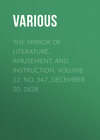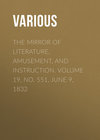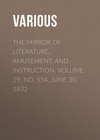Loe raamatut: «The Mirror of Literature, Amusement, and Instruction. Volume 12, No. 347, December 20, 1828», lehekülg 6
[Vidocq returns to Lille, where he is taken by two gendarmes, and concerts the following stratagem for escape:—]
This escape, however, was not so very easy a matter as may be surmised, when I say that our dungeons, seven feet square, had walls six feet thick, strengthened with planking crossed and rivetted with iron; a window, two feet by one, closed with three iron gratings placed one after the other, and the door cased with wrought iron. With such precautions, a jailor might depend on the safe keeping of his charge, but yet we overcame it all.
I was in a cell on the second floor with Duhamel. For six francs, a prisoner, who was also a turnkey, procured us two files, a ripping chisel, and two turnscrews. We had pewter spoons, and our jailor was probably ignorant of the use which prisoners could make of them. I knew the dungeon key; it was the counterpart of all the others on the same story; and I cut a model of it from a large carrot; then I made a mould with crumb of bread and potatoes. We wanted fire, and we procured it by making a lamp with a piece of fat and the rags of a cotton cap. The key was at last made of pewter, but it was not yet perfect; and it was only after many trials and various alterations that it fitted at last. Thus masters of the doors, we were compelled to work a hole in the wall, near the barns of the town-hall. Sallambier, who was in the dungeons below, found a way to cut the hole, by working through the planking.
THE PRISON OF BICETRE AT PARIS
The prison of Bicêtre is a neat quadrangular building, enclosing many other structures and many courts, which have each a different name; there is the grande cour (great court) where the prisoners walk; the cour de cuisine (or kitchen court;) the cour des chiens (or dog's court;) the cour de correction (or court of punishment;) and the cour des fers (or iron court.) In this last is a new building five stories high; each story contains forty cells, capable of holding four prisoners. On the platform, which supplies the place of a roof, was night and day a dog named Dragon, who passed in the prison for the most watchful and incorruptible of his kind; but some prisoners managed at a subsequent period to corrupt him through the medium of a roasted leg of mutton, which he had the culpable weakness to accept. The Amphytrions escaped whilst Dragon was swallowing the mutton; he was beaten and taken into the cour des chiens, where, chained up and deprived of the free air which he breathed on the platform, he was inconsolable for his fault, and perished piecemeal, a victim of remorse at his weakness in yielding to a moment of gluttony and error.
Near the erection I speak of is the old building, nearly arranged in the same way, and under which were dungeons of safety, in which were enclosed the troublesome and condemned prisoners. It was in one of these dungeons that for forty-three years lived the accomplice of Cartouche, who betrayed him to procure this commutation! To obtain a moment's sunshine, he frequently counterfeited death so well, that when he had actually breathed his last sigh, two days passed before they took off his iron collar. A third part of the building, called La Force, comprised various rooms, in which the prisoners were placed who arrived from the provinces, and were destined to the chain.
At this period, the prison of Bicêtre, which is only strong from the strict guard kept up there, could contain twelve hundred prisoners; but they were piled on each other, and the conduct of the jailors in no way assuaged the inconvenience of the place.
If any man arrived from the country well clad, who, condemned for a first offence, was not as yet initiated into the customs and usages of prisons, in a twinkling he was stripped of his clothes, which were sold in his presence to the highest bidder. If he had jewels or money, they were alike confiscated to the profit of the society, and if he were too long in taking out his ear-rings, they snatched them out without the sufferer daring to complain. He was previously warned, that if he spoke of it, they would hang him in the night to the bars of his cell, and afterwards say that he had committed suicide. If a prisoner, out of precaution, when going to sleep, placed his clothes under his head, they waited until he was in his first sleep, and then they tied to his foot a stone, which they balanced at the side of his bed; at the least motion the stone fell, and aroused by the noise, the sleeper jumped up, and before he could discover what had occurred, his packet hoisted by a cord, went through the iron bars to the floor above. I have seen, in the depth of winter, these poor devils, having been deprived of their property in this way, remain in the court in their shirts until some one threw them some rags to cover their nakedness. As long as they remained at Bicêtre, by burying themselves, as we may say, in their straw, they could defy the rigour of the weather; but at the departure of the chain, when they had no other covering than the frock and trousers made of packing cloth, they often sunk exhausted and frozen before they reached the first resting place.
[As we have said, the present is but a fourth portion of Vidocq's exploits; and if the remaining three are of equal interest, the work will be one of the most extraordinary of our times. We scarcely remember a counterpart, although the Memoirs of James Hardy Vaux are of the same stamp. The fate of the latter work was curious enough. The manuscript was sent by the author from New South Wales, whither he had been transported. It was printed in two small volumes, and published by an eminent west-end bookseller, who, for some unexplained motive withdrew the edition, which is, we believe, now in the printer's warehouse. The Editor of the "Autobiography" has, however, reprinted Vaux's memoirs in his series; their style is very superior to that of Vidocq's, (which is a translation) and as scores of worse books are printed annually, we rejoice at their rescue from oblivion.]
THE ANECDOTE GALLERY
WHITFIELD
Remarkable instances are related of the manner in which Whitfield impressed his hearers. A man at Exeter stood with stones in his pocket, and one in his hand, ready to throw at him; but he dropped it before the sermon was far advanced, and going up to him after the preaching was over, he said, "Sir, I came to hear you with an intention to break your head; but God, through your ministry, has given me a broken heart." A ship-builder was once asked what he thought of him. "Think!" he replied, "I tell you, sir, every Sunday that I go to my parish church, I can build a ship from stem to stern under the sermon; but, were it to save my soul, under Mr. Whitfield I could not lay a single plank." Hume pronounced him the most ingenious preacher he had ever heard; and said, it was worth while to go twenty miles to hear him. But, perhaps, the greatest proof of his persuasive powers was, when he drew from Franklin's pocket the money which that clear, cool reasoner had determined not to give; it was for the orphan-house at Savannah. "I did not," says the American philosopher, "disapprove of the design; but as Georgia was then destitute of materials and workmen, and it was proposed to send them from Philadelphia at a great expense, I thought it would have been better to have built the house at Philadelphia, and brought the children to it. This I advised; but he was resolute in his first project, rejected my counsel, and I therefore refused to contribute. I happened, soon after, to attend one of his sermons, in the course of which I perceived he intended to finish with a collection, and I silently resolved he should get nothing from me. I had in my pocket a handful of copper money, three or four silver dollars, and five pistoles in gold. As he proceeded I began to soften, and concluded to give the copper; another stroke of his oratory made me ashamed of that, and determined me to give the silver; and he finished so admirably, that I emptied my pocket wholly into the collector's dish, gold and all.
"At this sermon," continues Franklin, "there was also one of our club, who, being of my sentiments respecting the building in Georgia, and suspecting a collection might be intended, had, by precaution, emptied his pockets before he came from home; towards the conclusion of the discourse, however, he felt a strong inclination to give, and applied to a neighbour who stood near him, to lend him some money for the purpose. The request was fortunately made to perhaps the only man in the company who had the firmness not to be affected by the preacher. His answer was, 'At any other time, friend Hopkinson, I would lend to thee freely; but not now, for thee seems to me to be out of thy right senses.'"
One of his flights of oratory, not in the best taste, is related on Hume's authority. "After a solemn pause, Mr. Whitfield thus addresses his audience:—'The attendant angel is just about to leave the threshold, and ascend to heaven; and shall he ascend and not bear with him the news of one sinner, among all the multitude, reclaimed from the error of his ways!' To give the greater effect to this exclamation, he stamped with his foot, lifted up his hands and eyes to heaven, and cried aloud, 'Stop, Gabriel! stop, Gabriel! stop, ere you enter the sacred portals, and yet carry with you the news of one sinner converted to God!'" Hume said this address was accompanied with such animated, yet natural action, that it surpassed any thing he ever saw or heard in any other preacher.—Southey.




















